Low FODMAP Corned Beef & Cabbage
The traditional dish Corned Beef and Cabbage was ripe for a low FODMAP makeover.
Corned Beef is Not Always Low FODMAP
I found a few low FODMAP recipes on the Internet and was surprised to see that there was no discussion about purchasing the right kind of corned beef to begin with.
While you might think of this dish around St. Patrick’s Day, it is really a fantastic one-pot dish for anytime. And it is even better made ahead, so it works well for parties.
How to Make Low FODMAP Corned Beef
You can make your own corned beef from scratch, but it is easy enough to buy the prepared product to start with – the trick is label reading! Beef that is “corned” is cured in brine.
Many traditional corned beef brines contain garlic and that would create a high FODMAP product. You must read labels and start with a corned beef that has been cured and prepared with no high FODMAP ingredients.
It was very easy for me to find what I needed in the basic supermarket. As an aside, the ones at the pricier stores, like Whole Foods, did have garlic in them! In this case, basic was better.
Point Cut or Flat Cut?
Then there is the choice of cut of meat. Corned beef is usually made from brisket (although round or silverside can be used) and there are often two main cuts to choose from: the point cut and flat cut. The point cut is fattier and considered more flavorful by many.
The flat cut is more even in shape, so it will cook more evenly as well, and is leaner. It makes prettier slices, if that’s important to you. I used the flat cut for this recipe. I didn’t think we needed the extra fat and my recipe imbues plenty of flavor.
Cabbage – Choose the Right One
Good old green cabbage, which is what is traditionally used for this dish, is low FODMAP at ¾ cup (75 g). The threshold is very low as Monash considers it high in FODMAPs at 100 g (1 cup), so serve your portions carefully.
FYI Monash calls it “common cabbage” on the smartphone app. Just do not buy Savoy cabbage for this recipe, which is also pale green in color, but is considered higher in FODMAPs.
Carrots are featured in this dish as well and they are free of detectable FODMAPs, so we add a lot of them. Ditto for the potatoes.
Speaking of Potatoes
Many classic corned beef and cabbage recipes call for very floury, starchy potatoes and the truth of the matter is that I do sometimes opt for those. I do like the Yukon gold potatoes, for their semi-starchy texture and rich gold color.
You can choose either, just do not use a waxy potato for this dish.
Horseradish is Low FODMAP
Horseradish was recently added to the ingredient list on the Monash smartphone app and is low FODMAP at 2 Australian tablespoons (42 g). I like to offer horseradish as well as a simple lactose-free Sour Cream Mustard Sauce alongside, made with lactose-free sour cream, of course.
Plan ahead because this dish does take several hours to prepare. I like to make it a day or two ahead. I think it is even better!
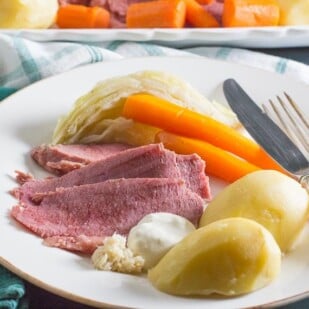
Corned Beef & Cabbage
Our Corned Beef & Cabbage is low FODMAP and just as tasty as the traditional version! It is a super-easy one-pot dish, and although it does take a while to cook, it is unattended time.
Ingredients:
Corned Beef:
- 4 pounds (1.8 kg) low FODMAP corned beef (see headnote, above)
- Water
- 3 sprigs fresh flat leaf parsley
- 2 sprigs fresh thyme
- 1 bay leaf
- 1/2 teaspoon whole allspice
- 1/2 teaspoon black peppercorns
- 1/2 teaspoon coriander seed
- 1/2 teaspoon mustard seed
- 1/4 teaspoon whole cloves
- 3 pounds (1.4 kg) small or medium Yukon gold potatoes, peeled, halved if desired
- 2 pound (910 g) (or less) head of green cabbage, loose outer leaves removed, root end trimmed, cut into large wedges
- 1 pound (455 g) carrots, peeled, ends trimmed and discarded, cut into 2-inch lengths (see Tips)
Sour Cream Mustard Sauce:
- 1 cup (240 ml) lactose-free sour cream
- 2 tablespoons Dijon mustard
Preparation:
-
You have to start with a large pot or Dutch oven, such as an 8 quart (7.5 L) size. Rinse the corned beef well then place in the pot and fill with cool water to cover. Add parsley, thyme, bay leaf, allspice, peppercorns, coriander seed, mustard seed and whole cloves. Cover, bring to a boil over high heat, then adjust heat and gently simmer for 3 hours. Check occasionally and skim off and discard any foam that rises to the top.
-
Meanwhile, prep your vegetables. Add the potatoes, wedges of cabbage and carrots to the pot, tucking them here and there around the corned beef. Cover and simmer for another 1 hour.
-
Make the Sauce: Simply stir the sour cream and mustard together; set aside.
-
Remove meat from cooking liquid and allow to sit for 10 minutes. Slice thinly across the grain and arrange on a serving platter along with the potatoes, cabbage and carrots. Pass the Sour Cream Mustard Sauce and horseradish! You can also store the meat and vegetable in the cooking liquid overnight in the pot or up to 3 days. Reheat gently as needed. We like our corned beef and cabbage even better after a day or two!
Notes:
If You Can Tolerate
- Lactose: If you have passed your Lactose Challenge, feel free to use conventional sour cream.
Nutrition
All nutritional information is based on third-party calculations and should be considered estimates. Actual nutritional content will vary with brands used, measuring methods, portion sizes and more. For a more detailed explanation, please read our article Understanding The Nutrition Panel Within Our Recipes.
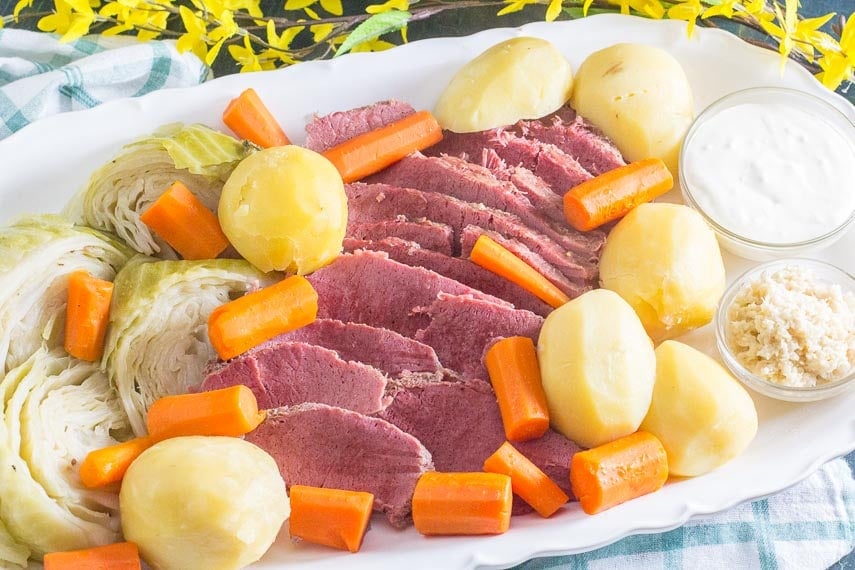
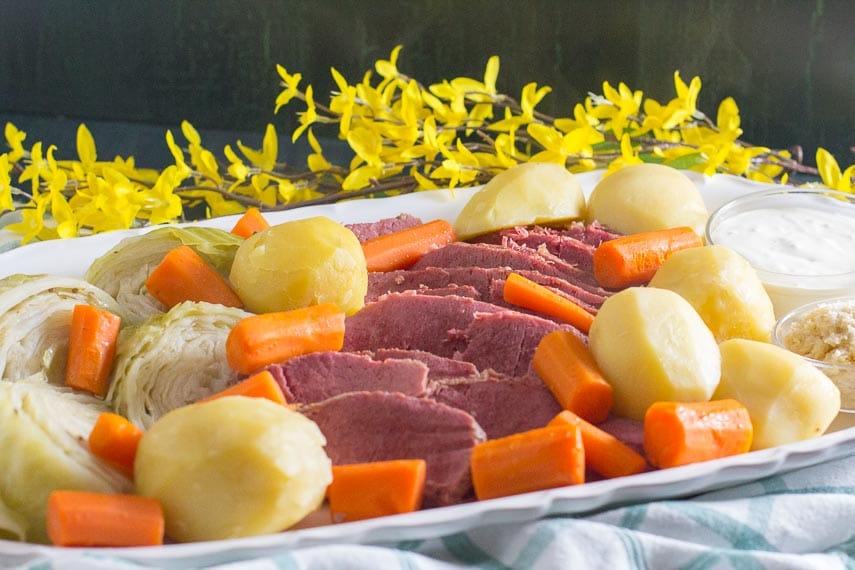
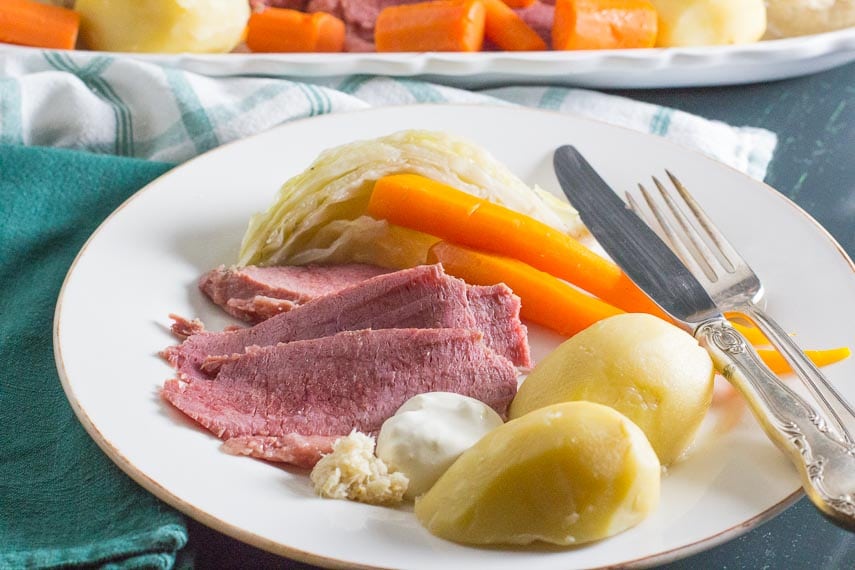
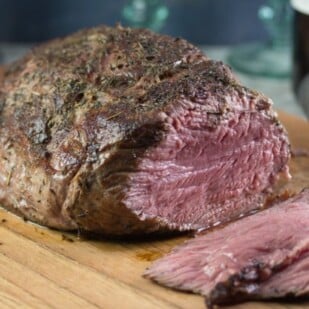
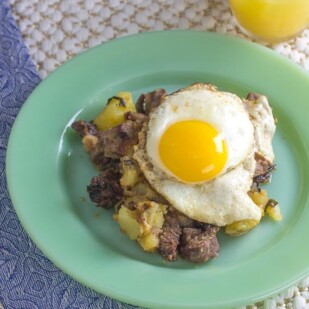




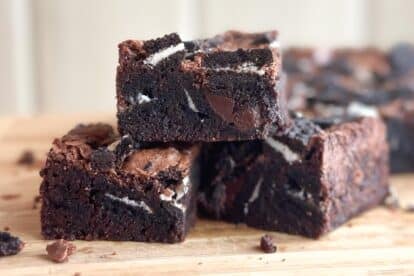
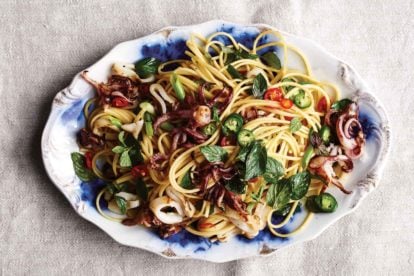
So this is done like a soup on top of stove? Not in the oven?
Hi Maura, correct, this is simmered gently on top of the stove. There are recipes that use a slow cooker or the oven but I did not take that approach for this version, which is a very classic approach. It is a braise that is simmered in a large amount of liquid. I am already sad that the leftovers are gone! Let us know if you try it.
Hi Dede,
I made this today! Oh my gosh it was delicious. Also the boiled carrots took me right back to my grandmother’s kitchen. Thanks so much for this recipe.
Emily
Emily, we are thrilled to hear this! My Mom would make this but once a year and I always loved it. The fact that we can have nostalgic comfort food while on the diet is so important. I was really sad when the leftovers were gone and vowed not to wait till every March to make it!
Hello, is it possible to halve this recipe? 4lbs is too much for just me and my Dutch oven is a little smaller than yours.
Sure! You can halve the recipe with simple math. Everything will work the same in terms of ratios. Your cooking time might be less. Simply check for doneness. Check at about 2 hours initially and the subsequent cooking time might be less as well.
Can you tell me if Safeway Signature Select Corned Beef is low- Fodmap? it contains “natural flavorings” and I am finding it difficult to get an answer from the company. What brand did Dede use for the recipe?
Hi there! This recipe was developed several years ago and I do not know the brand that I used at the time. The problem with researching natural flavors is that they are obtained from third parties. So very often manufacturers of the item you’re using do not know the information. And if you were to find out who made the natural flavors those companies typically tell the public, including the corn beef manufacturers, that the blend is proprietary. Sometimes you can hammer away at them and explain that you need this for allergy purposes but typically it doesn’t get you far unfortunately. It is really a matter of understanding how sensitive you are or not. Natural flavors are very often the last item in an ingredient list. Take a look at our article about them .